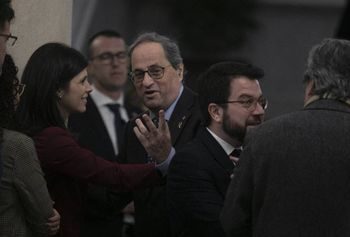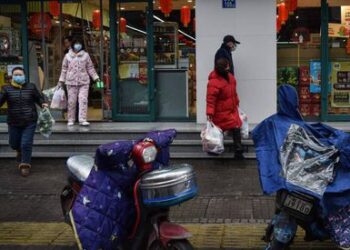
Officials from Spain’s Socialist Party (PSOE) will meet on Tuesday with representatives of six regional parties to seek their support for caretaker Prime Minister Pedro Sánchez, who is trying to get confirmed in office following the inconclusive repeat election of November 10.
These meetings come a day after Sánchez met with the conservative Popular Party (PP) and center-right Ciudadanos (Citizens) to explore the possibility of an alternative majority that would enable him to form a government and avoid a third general election in the space of a year.
The PSOE’s “Plan A” is to convince the ERC to abstain at the second round of the investiture debate
But both parties reiterated on Monday that they will not facilitate a Sánchez-led administration that would award key cabinet positions to the left-wing anti-austerity Unidas Podemos group.
This leaves Sánchez, who won 120 seats on November 10 – far short of the 176 required for an absolute majority – with the option of seeking endorsement from a collection of smaller regional parties, mirroring the alliance that helped him lead a successful no-confidence vote in June 2018 against then-Prime Minister Mariano Rajoy of the PP.
A historical first
Adriana Lastra, the general vice-secretary of the PSOE, will head the meetings with the Catalan Republican Left (ERC), Together for Catalonia (JxCat) and Popular Unity Candidacy (CUP); with the Basque far-left nationalist EH Bildu, with the Valencia region’s Compromís, and with Más País, a recently created center-left party headed by former Podemos official Iñigo Errejón.
Socialist sources noted that it will be the first time that Sánchez has met with Catalonia’s pro-independence CUP, a small far-left party that has played the role of kingmaker in Catalan politics and now holds two seats in Spanish Congress.
It will also mark the first time that the Socialist leader has met with the Basque Country’s EH Bildu, a party born out of the northern region’s radical nationalist milieu (known traditionally as the abertzale left) and whose leader Arnaldo Otegi has served time over his decades-long association with the now-defunct terrorist group ETA. EH Bildu currently has five lawmakers in Spanish Congress.
Casado said that he had asked Sánchez “five times” if he had a different offer for the PP
“It will be a first contact; this is the first time that this party [PSOE] has met with Bildu,” said Lastra. Up until now the Socialists had refused any kind of meeting with Otegi’s party, aware that it could have a political cost.
The far-right Vox, which soared from 24 to 52 lawmakers between the April and November elections, is the only party with congressional representation that has refused to meet with the PSOE.
Sánchez is also telephoning Spain’s regional leaders on Tuesday to seek backing for his bid. Following protocol, the first conversation was with the Basque premier, Iñigo Urkullu of the social-democratic Basque Nationalist Party (PNV), followed by the premier of Catalonia, the separatist Quim Torra, who insisted on the right to self-determination and asked the caretaker PM for a meeting, according to sources in the Catalan government.
No change of plans
The Socialist Party (PSOE) is continuing to seek to form a coalition government with Unidas Podemos, with the abstention of the ERC. Both parties have been in talks ahead of an investiture debate in Congress and subsequent vote to appoint a new PM.
The repeat general election on November 10 saw the PSOE take the most seats in Spain’s lower house of parliament, the Congress of Deputies but, as in April, fall well short of an absolute majority. Shortly after the election result was known, the PSOE announced a planned coalition deal with Unidas Podemos. But the two parties still need the support of other groups if Sánchez is to successfully win an investiture vote.
A ‘Frankenstein government’

Elsa García de Blas, Madrid
The parliamentary spokesperson from center-right Ciudadanos (Citizens), Inés Arrimadas, also met with caretaker Prime Minister Pedro Sánchez on Monday. “I’ve come to get that idea out of his head,” she said before her first one-to-one meeting with the Socialist Party (PSOE) chief, in reference to his planned coalition government with Unidas Podemos.
She was unable to persuade Sánchez to change course, however, but said afterwards that there was still” hope” that her proposal of a “grand pact” between the PSOE, the Popular Party (PP) and Ciudadanos could prosper.
“If the ‘Frankenstein government’ fails,” she said in reference to the planned deal, which will need the abstention of the Catalan Republican Left (ERC), “Sánchez may see himself obliged, albeit out of necessity, to open the path for the [pro-Constitution parties].”
The PSOE’s “Plan A” is to convince the ERC to abstain at the second round of the investiture debate, at which a simple majority – more yes than no votes – is needed for Sánchez’s bid to prosper. The details of the negotiations, however, are currently unknown. The ERC – which supports Catalan independence – wants a commitment to talks between the central government in Madrid and the Catalan regional government on the future of the northeastern region.
On Monday, Adriana Lastra spoke to reporters about the current situation, and asked for “understanding” from its supporters for the party’s silence. “The deal, if it is done, will be public, subject to legal protection, to the rules, the law, and the Constitution,” she said. “The entire PSOE is working so that this country can have a government as soon as possible.”
During the failed negotiations to form a government after the April elections, Sánchez often stated that the pro-independence parties “cannot be trusted,” adding that he didn’t want to have to depend on them to be able to govern the country. But now the PSOE’s message is that there is no other choice. “We are trying to avoid a third election [in a year], and offer stability,” Lastra said on Monday. “We want to form a government to do many things, among others to repeal the more damaging aspects of the labor reform, and we are also talking about that with the ERC.”
No PP “whitewash”
Earlier in the day, caretaker Prime Minister Pedro Sánchez met with the leader of the main opposition Popular Party (PP), Pablo Casado. After an icy greeting, the pair spent 40 minutes in talks, but there were few surprises afterwards.
“The PP cannot be the party that whitewashes the deal with Podemos,” Casado said afterwards of his group’s refusal to abstain at an investiture vote to allow Sánchez to form a government. “This would be like calling on Pedro Sánchez to facilitate a government in which Vox has the deputy prime ministerial role,” he said in reference to the far-right party, now the third-largest group in Congress. Favoring a PSOE-Unidas Podemos government would, Casado added, be “lethal for Spain and suicidal for the party.”
Speaking to the press on Monday, Casado said that he had asked Sánchez “five times” if he had an offer for the PP apart from calling on them to abstain. “He said no,” he explained.
Casado went on to argue that Sánchez’s decision to negotiate with ERC is “deliberate,” and is not essential in the circumstances, claiming that a deal between the PSOE, Podemos and center-right party Ciudadanos could be sought – as was the case in 2016, after another inconclusive election. “The PSOE will end up being devoured by the pro-independence [parties],” Casado added.
Spain has been to the polls four times in as many years, and may have to return to yet another general election should Sánchez’s current bid to form a government fail. The caretaker prime minister is keen to hold an investiture debate before Christmas, but the ERC has stated that it is in no hurry to close the deal. That said, the talks are entering their final phase this week.
With reporting by Carlos E. Cué and Natalia Junquera.
English version by Simon Hunter and Susana Urra.
Get real time update about this post categories directly on your device, subscribe now.





















